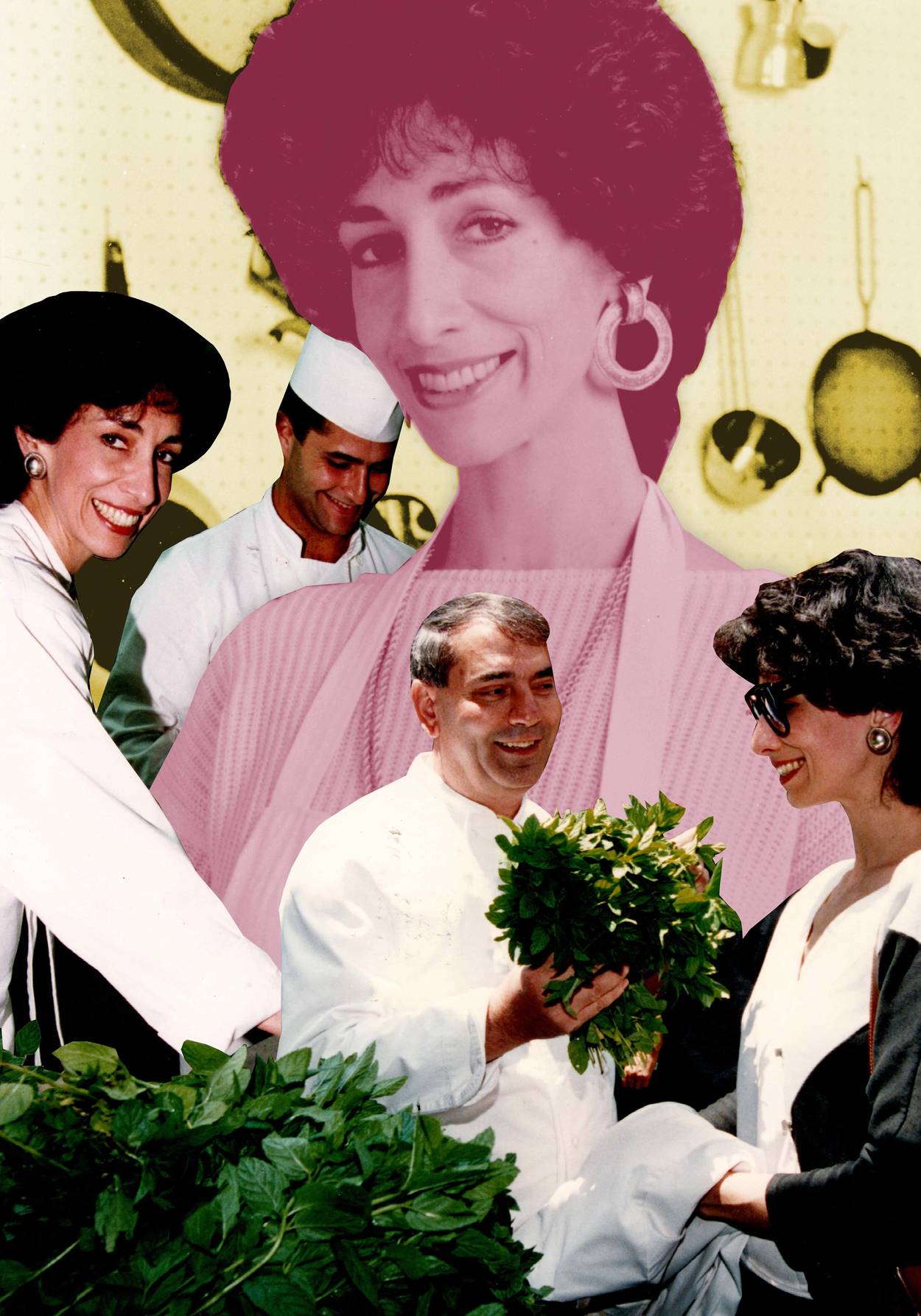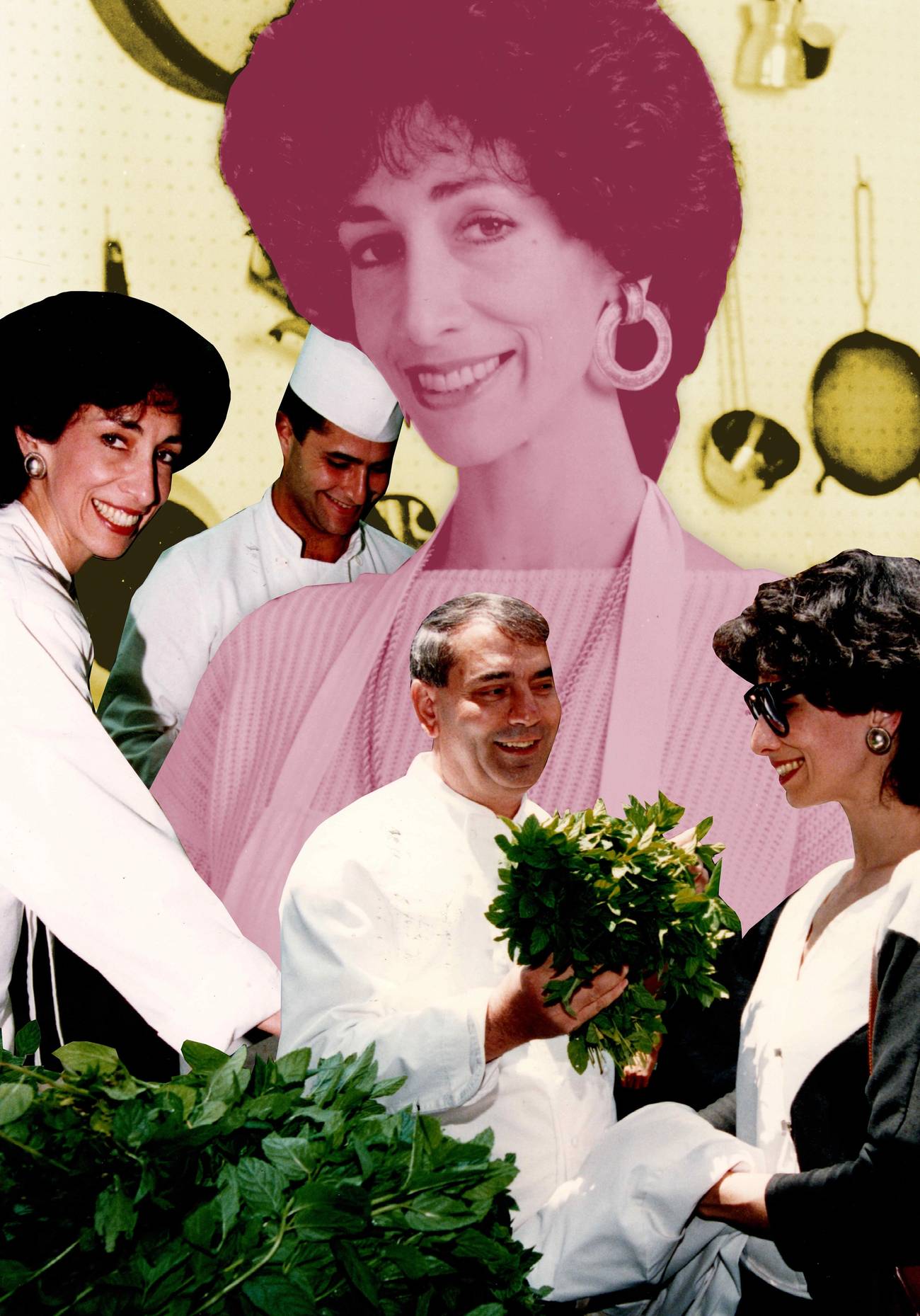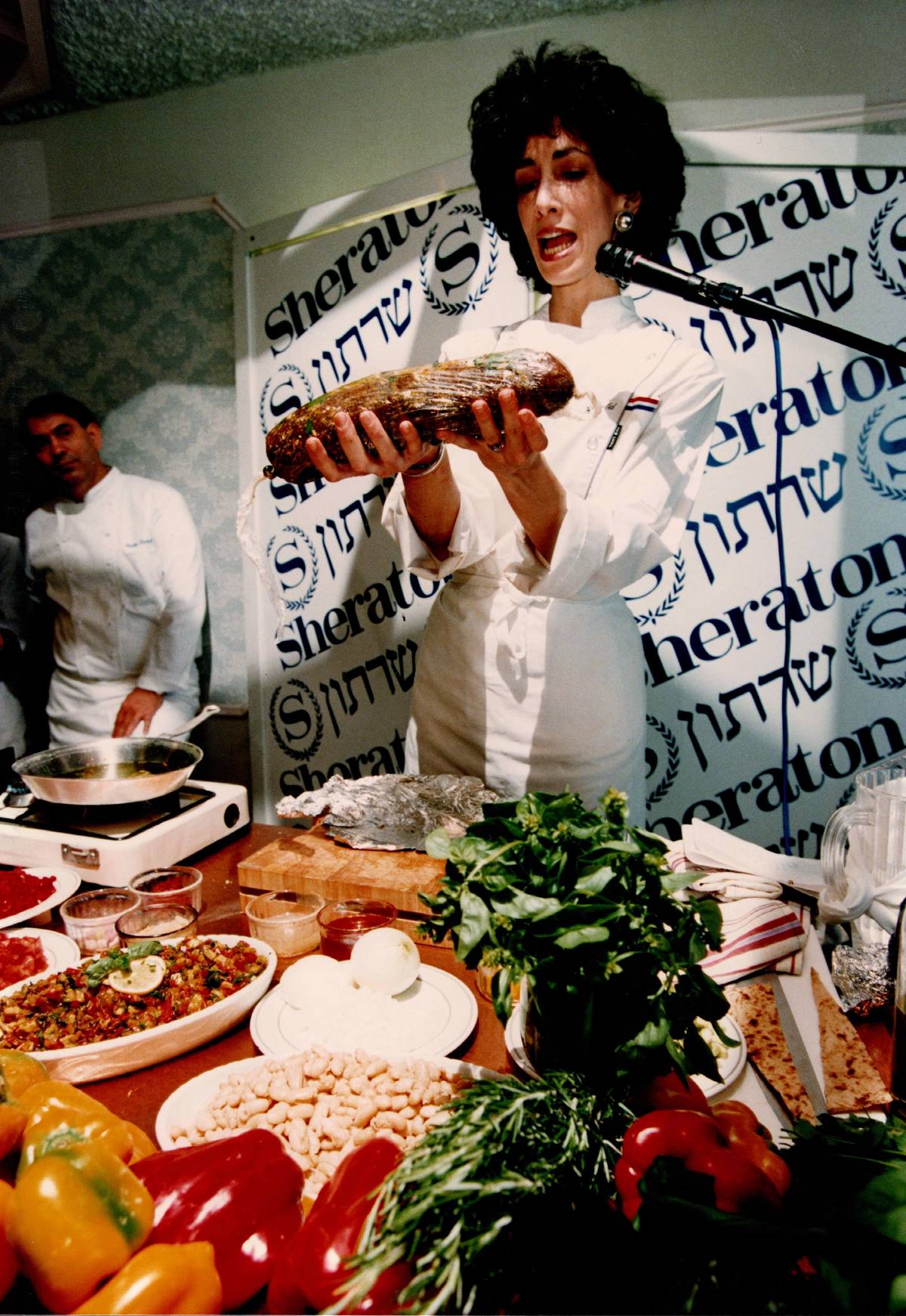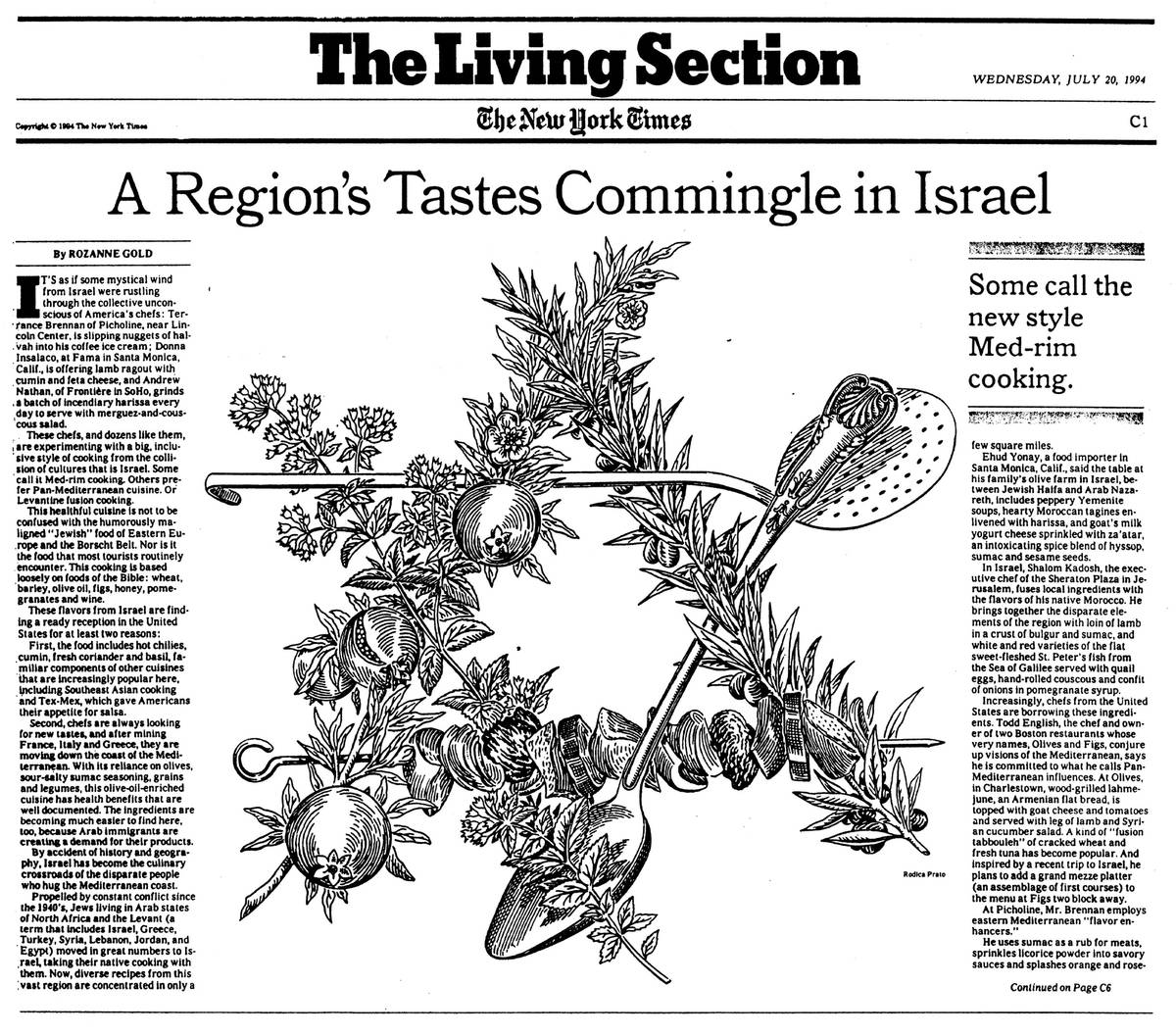The Unofficial Spokesperson of Israeli Food
Award-winning chef Rozanne Gold opened American eyes to Israeli cuisine—decades before it became trendy




Like so many wanderlusting 20-somethings, Rozanne Gold had a life-changing culinary experience while traveling abroad. But instead of falling, starry-eyed, into a plate of cacio e pepe in Rome, or finding herself in the buttery depths of a Parisian pain au chocolat, her heart-expanding moment arrived in the shape of the briny feta and za’atar, grilled fish drizzled with tahini, and smoky charred eggplant that she ate in Israel in 1980.
“I wasn’t brought up religious at all, but there was something transformational about the food in Israel that was unexpected,” said Gold, a native New Yorker and award-winning chef and cookbook author. In a twist of fate, hard work, and good timing, Gold befriended then-Prime Minister Menachem Begin and his wife, Aliza Arnold, in 1978 while working as the personal chef for then-New York Mayor Ed Koch. After connecting with Gold at Gracie Mansion, the Begins invited her to tour Israel as their guest.
Traveling abroad with VIP status at the age of 26 was a heady experience. But even more than the perks, Gold was blown away by the country’s sweet-as-candy cherry tomatoes, the overlapping Middle Eastern, North African, and Eastern European food traditions, the refined cooking by pioneering Israeli chef Shalom Kadosh, and what she called the country’s “entire language of white cheeses.”
“I had traveled to other places, but Israel was like Technicolor,” she said. “It spoke to my soul.”
Today Israel is renowned—almost fetishized—for its sparkling cuisine and celebrated chefs like Yotam Ottolenghi, Meir Adoni, Erez Komarovsky, and Eyal Shani, among others. But in 1980, when Gold first traveled there, the country’s culinary reputation was, at best, nonexistent. “Tourists loved visiting ‘the Holy Land,’ but the food was absolutely appalling,” said Geoffrey Weill, who runs a travel-focused public relations agency in New York City.
Janna Gur, the Israeli cookbook author and founder of the country’s influential food magazine Al Hashulchan agreed. “Long before I became a food writer I worked as a flight attendant,” she said. “I remember passengers from the United States regularly asking me, ‘Why is the food so terrible?’”
In truth, there were plenty of delicious meals being shared in Israel—but no established restaurant culture. As cookbook author (and regular Tablet contributor) Joan Nathan wrote in The Foods of Israel Today about that time period, “Only tourists, diplomats, or foreign journalists ate in restaurants.” The country was young and resources were tight. Most Israelis thought of dining out as a frivolous waste of money, so there was not a lot of incentive for the restaurants that did exist to shine. Still, if one knew where to look—the humble hummus stands and late-night grills in the shuk, small farms tucked off the beaten path or, if one was really lucky, someone’s home kitchen—there was magic to be found.
Gold wasn’t deterred when friends back in New York City chided her for her breathless accounts of Israel’s food. If anything, it imbued her with a sense of purpose. In July 1980, shortly after returning from her life-changing trip, she published an article in the New York Daily News about the unknown (in America anyway) Israeli breakfast—the fragrant butter and marmalade spread on soft challah rolls, goat cheese sourced from Arab markets, chopped tomato and cucumber salads, juicy olives and cream herring, and pitchers of fresh Jaffa orange juice. “Doing breakfast, Israeli style, could soon become the rage in summer entertaining,” she wrote.
As if willing that thought into reality, she founded a marketing and import company called Foods & Wines from Israel, which hosted events and dinners featuring Israeli-made olive oil, cheeses, wine, and other products. While other up-and-coming American chefs obsessed over the era’s nouvelle and California cuisines, Gold said, “I made myself the unofficial spokesperson of Israeli food.”
In 1984, Gold convened a group of American journalists and food writers—including Arthur Schwartz, Phyllis Glazer, and Paula Wolfert—to visit Israel. Today, food writers are regularly courted by the Israeli tourism board, but Gold’s trip was the first of its kind. “Unfortunately, the ministry didn’t know what they were doing,” said Weill, who was the director for Israeli tourism at the time. “They were proud that there was a McDonald’s and that you could get a steak,” he said. The journalists’ first stop, just off the plane and still jet-lagged, was a lollipop factory. “Everyone kept glancing at each other and trying not to giggle,” Weill said. “They were not interested.”

With a little schedule adjustment, the group managed to get a glimpse of the foods that had so captured Gold’s heart. “My standout memory of that trip was eating foie gras on the street in Tel Aviv,” said Schwartz, a cookbook author who was then the food editor for the Daily News. The goose livers were served at the blue-collar Avazi grill—not resting on a swipe of reduced port wine as one would find them at a high end restaurant, but threaded onto skewers, singed over charcoal, and humbly plated with french fries. In other words: foie gras as street food.
Thanks to a handful of Middle Eastern restaurants in New York City run by Lebanese and Syrian immigrants, the city’s diners were already familiar with dishes like falafel, tabbouleh, and baba ghanouj. But Gold helped expand and complexify the landscape. “Without Rozanne, nobody in the States would have known about that foie gras,” said Weill. “She opened American eyes to the possibility of food in Israel.”
Most importantly, Gold cooked. The same year as the journalist trip, Gold joined legendary New York City restaurateur Joe Baum (The Four Seasons Restaurant, Windows on the World, The Rainbow Room) as chef-director for his restaurant consulting company. Over the next decade, she leveraged her position within New York’s fine-dining scene to introduce what she called “Med-Rim” cuisine. Because of Israel’s dismal culinary reputation, Gold said, “I couldn’t openly call it Israeli cuisine yet.” But her inspiration was clear. One representative dinner at The Rainbow Room from the mid-1990s included wine-baked olives, rack of lamb with za’atar, and orange cardamom cakes—dishes that could easily be found on a modern Israeli or Middle Eastern restaurant’s menu today.
“I remember her saying, ‘We’re going to make za’atar the new spice everyone puts on everything,’” Weill said. “We’re talking almost 40 years ago.” By contrast, Yotam Ottolenghi would have been in middle school. Gur remembers reading an article Gold wrote in the 1990s describing the food in Israel as an evolving cuisine that combined Jewish and Arabic food traditions with a particularly North African slant. “I remember thinking, ‘Wow, that’s spot on. Somebody knows what she’s talking about.’”

Gold, of course, did have a few contemporaries who were enchanted by Israel’s food long before others saw its potential. In Israel, author Ruth Sirkis published several influential books about Jewish and Israeli cooking. Her 1985 Popular Foods From Israel made dishes like falafel, schnitzel, and baklava accessible to a wider audience. Meanwhile Joan Nathan, like Gold, forged a deep love affair with Israel’s many overlapping cuisines in her 20s, while working as the press attaché for Jerusalem’s mayor in the 1970s. Nathan’s first cookbook, The Flavor of Jerusalem, which she co-wrote with Judy Stacey Goldman in 1975, launched her lifelong career as a celebrated Jewish food writer. “That little book was, and still is, one of my favorites ever written,” Gold said.
In those early years Gold was frequently written about in the Israeli press, which was as enamored with her—a bright, young, female American chef—as she was of the country’s cuisine. “In a funny way, I felt like I was really ‘seen’ in Israel,” Gold said. Gur remembers first noticing Gold when she visited Israel as part of a Women Chefs for Peace gala dinner. “It’s hazy, but I definitely remember her,” Gur said. “She’s this tall and stunning person, you can’t miss her.”
And yet, while Gold did more than most to increase Israeli food’s visibility stateside, she never quite received the same recognition for her efforts back home. And today, as Israel continues to come into its power as a gastronomic force—vaulting a new generation of chefs and cookbook authors into the limelight—Gold’s legacy is too rarely part of the conversation.
In 1995 she wrote a book proposal about “Med-Rim” cuisine that publishers brushed off as “too breezy.” With its effusive insistence that Med-Rim cooking was ready for its close up, and proposed recipes for roasted chicken with sumac, seven-hour leg of lamb marinated in pomegranate juice, and pears poached in arak syrup, it seems clear that the proposal was simply too far ahead of its time.
Being ahead of her time is an experience Gold understands quite well. “People used to say that Joe Baum was ‘too previous,’ and I feel the same way,” she said. “That’s how I’ve been my whole life.” Indeed, throughout her career, Gold has forecast or championed multiple food trends, including encouraging New York chefs to embrace locally grown Hudson Valley produce in the 1980s when the idea seemed laughably provincial. She also wrote about cooking full meals on a sheet pan for Bon Appetit in 2012, several years before it became a dinnertime craze.
To her great credit, Gold takes an equanimous view of her role as a food prophetess. “Trends happen slowly, and not in a linear way,” she said. “I had to find a way to be at peace with that.” Those who do remember the role Gold played in spreading the gospel of Israel’s culinary potential do not hold back. “Rozanne didn’t invent Israeli cuisine,” Weill said. “But she saw it first.”